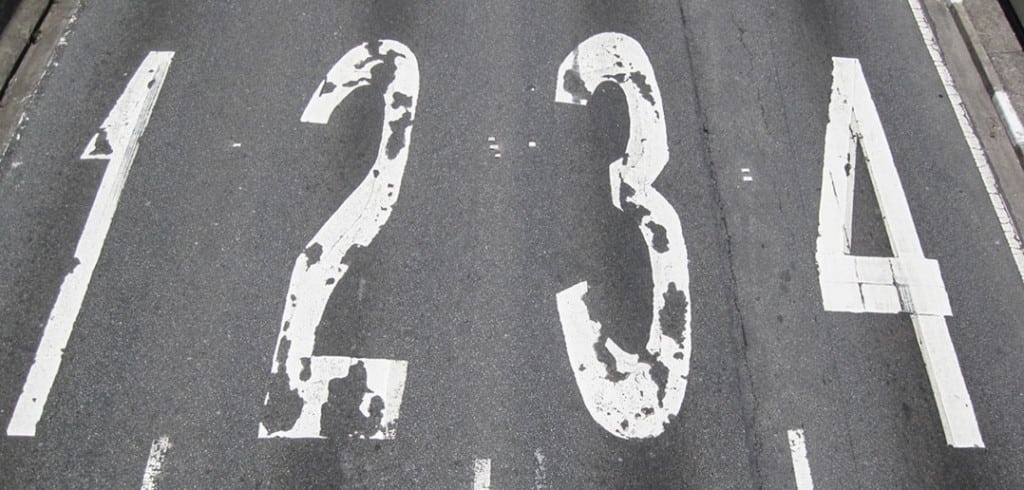There are lots of interesting idioms and superstitions about numbers, some of which are just colorful and others that are just plain dumb. For instance, it’s true that there is safety in numbers — as long as you don’t run into public enemy No. 1. And if you do, let’s hope your days aren’t numbered.
How about the number 13? Its unlucky stigma and Friday the 13th superstitions suggest that one more than a dozen is something to be avoided. But when it comes to a delicious treat, the baker’s dozen sure is sweet.
I pay a lot of attention to the number 3 but not because good or bad things come in threes. In all seriousness, groups of three are pretty important in our society. When we need to simplify or condense an important topic, we talk about “learning the ABCs.” It seems like every pastor I’ve ever had was taught how to preach the three-point sermon (don’t get any wild ideas about adding a fourth, Scott). And when it’s time to coax my 2-year-old into jumping into the swimming pool, what do I say? “One … two … THREEEEE!”
Yes, groups of three are a big deal in the United States. The governance of our very society is based upon them. Think back to your high school civics class. What are the three levels of government? Federal, state and local. At each level, what are the three branches of government? Executive, legislative and judicial. What are the three steps to passing a law? Pass the House of Representatives, pass the Senate and be signed by the executive.
And things aren’t much different when it comes to your electric service. In Tennessee, we all are fortunate to benefit from an exception to the rule of three.
There are three sectors, or steps, in the delivery of electric power that must work in harmony to keep your lights on. First, there is generation. This is what most folks think of when the electric industry is mentioned. Large, centralized power plants work by converting a raw material (natural gas, coal, uranium, flowing water in a river, etc.) into the energy that powers our lives. Because power generation is expensive, it makes sense to build plants that generate enough power to spread the costs over the hundreds of thousands of homes and businesses that one plant is capable of serving.
Second, the energy that is created at a remote power plant has to be delivered closer to its users. This sector is called transmission, and you’re probably used to seeing the large steel towers (they look like they were made from giant Erector Sets) that hold electric lines spanning miles and miles of landscape. Those large lines terminate at substations, where the third and final piece of the puzzle, distribution, begins.
Your local electric cooperative takes the energy at the substation and delivers it to your home or business over a network of smaller poles and wires. This is the one sector that has the most direct impact on most Americans for a very simple reason: The distributor — your electric utility — is who you pay when the bill comes due. In much of the U.S., all three steps are performed by a single company. Especially in our largest cities, folks rely on names like ConEd, Pepco or Duke Energy to be their generator, transmitter and distributor of electric power. By and large, these companies do a good job. Typically, they are owned by investors and shareholders whose first consideration is to return a profit over and above the cost to provide the power on which consumers rely. Those shareholders may or may not be actual customers of the utility. Not so here in Tennessee.
You are a member of an electric cooperative, not just a customer of a company. And your electric co-op is owned only by you and your neighbors, the same folks who depend upon reliable service to keep the lights burning. All of the 22 electric co-ops across Tennessee work the same way by providing only the distribution of electric power, and all rely on the Tennessee Valley Authority to reliably generate and transmit power to them. Working together, we do a great job, even if we don’t adhere to the rule of three. But that’s not where the story ends.
Not one penny of your electric bill is diverted to a shareholder on the other side of the world. Your money stays local and pays the salaries of many of your neighbors. That is because both TVA and your local co-op are not-for-profit. The charges you pay are used only to recoup the cost of providing you with electricity and to keep the electric system strong. Why is that such a good thing? Because it means your co-op is always looking out for No. 1: you.



